|
|
|
Sort Order |
|
|
|
Items / Page
|
|
|
|
|
|
|
| Srl | Item |
| 1 |
ID:
164157
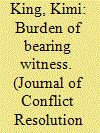

|
|
|
|
|
| Summary/Abstract |
Intersections exist regarding how institutions and individuals respond in the wake of mass violence, and we explore one theoretical perspective: resilience—the ability to overcome in the face of adversity. By controlling for the institutional context, we analyze the microlevel impact of testifying on witnesses who testify. New survey data provide information from 300 prosecution, defence, and Chambers witnesses who appeared at the International Criminal Tribunal for the Former Yugoslavia. We test propositions about resilience related to trauma, motivations, contributions to justice, fair treatment, witness fatigue, and human security. Witnesses who experienced greater trauma, who were more highly motivated, who believed they contributed to justice, and who were satisfied with their current situation were more positive about testifying. Those who believed they were treated fairly by prosecution and defence were less negative. The findings add to the debate about the burden of bearing witness in post-conflict societies and why some overcome adverse experiences related to mass violence.
|
|
|
|
|
|
|
|
|
|
|
|
|
|
|
|
| 2 |
ID:
160783
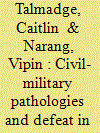

|
|
|
|
|
| Summary/Abstract |
This article uses an original data set, the Wartime Civil-military Relations Data Set, to test arguments about the causes of victory and defeat in war. Our analysis provides strong initial support for the notion that civil-military relations powerfully shape state prospects for victory and defeat. Specifically, states whose militaries have a significant internal role or whose regimes engage in coup-proofing appear to have a substantially lower probability of winning interstate wars, even when we account for the role of other important variables, including regime type and material capabilities. Crucially, our measures of civil-military relations include coup incidence but also move beyond it to detect more subtle indicators of civil-military relations. The resulting analysis should give us confidence in acknowledging the importance of nonmaterial variables in explaining war outcomes, while also paving the way for further research that can utilize and extend the data set.
|
|
|
|
|
|
|
|
|
|
|
|
|
|
|
|
| 3 |
ID:
110539
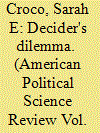

|
|
|
|
|
| Publication |
2011.
|
| Summary/Abstract |
A leader's culpability for involving his state in a conflict affects both his war termination calculus and his domestic audience's willingness to punish him if he loses. I define a culpable leader as any leader who either presides over the beginning of a war, or comes to power midwar and shares a political connection with a culpable predecessor. Using a data set created specifically for this study, I find that culpable leaders are more likely than nonculpable ones to achieve favorable war outcomes. I also find that domestic audiences will be willing to punish culpable leaders who lose, yet spare nonculpable leaders who do the same. Taken together, my findings underscore the need to appreciate more fully the role individual leaders play in bringing their states to war.
|
|
|
|
|
|
|
|
|
|
|
|
|
|
|
|
| 4 |
ID:
152415
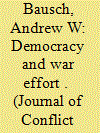

|
|
|
|
|
| Summary/Abstract |
This article uses a laboratory experiment to explore how groups’ internal rules for leader selection affect how leaders select into and fight conflicts. The findings reveal that, counter to expectations, leaders of democratic groups were more likely than leaders of autocratic groups to select into a conflict rather than accept a negotiated settlement. Conditional on conflict occurring, democratic leaders did not mobilize more resources for war than autocratic leaders. However, democratic leaders were less likely to accept a settlement once a war was underway and they expended more effort in the last round of conflict, suggesting once they entered a war they fought for a decisive victory. Domestically, democratic leaders were punished for losing wars more often than autocratic leaders, while winning wars did not benefit democratic leaders significantly.
|
|
|
|
|
|
|
|
|
|
|
|
|
|
|
|
| 5 |
ID:
155783
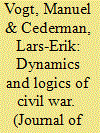

|
|
|
|
|
| Summary/Abstract |
This article reviews the literature on civil war. We focus on the most recent period of scholarly activity, beginning in the early 2000s when the publication of prominent quantitative studies triggered a surge in the empirical research of civil war as a well-defined conceptual category. We identify three explanatory logics that have dominated much of this literature and that view civil wars as a consequence of greed, grievances, and opportunities, respectively. We evaluate the arguments and findings of these theoretical approaches with respect to each of the main phases of war: outbreak, wartime dynamics, conflict termination, and postwar recovery. The article concludes by identifying key challenges confronting future civil war research. In particular, we emphasize the continuing need to advance theories that bridge the main explanatory logics as well as the different phases of conflict. Researchers should also pay more attention to defining the appropriate spatiotemporal scope of their studies.
|
|
|
|
|
|
|
|
|
|
|
|
|
|
|
|
| 6 |
ID:
173772
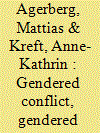

|
|
|
|
|
| Summary/Abstract |
Sexual violence (SV) in conflict is increasingly politicized at both the international and domestic levels. Where SV in conflict is prevalent, we argue international actors perceive gender to be salient and push for a gendered response. Simultaneously, women mobilize politically in response to the threat to their security that conflict-related SV constitutes, making demands for greater representation in politics with the goal of improving societal conditions for themselves. Jointly, we theorize the pressures from above and below push governments in conflict-affected states toward adopting gender policies. We test this theoretical framework in the case of gender quota adoption. We find that states with prevalent wartime SV indeed adopt gender quotas sooner and at higher rates than states experiencing other civil conflicts and than states experiencing no conflict in the same period. These gender quotas, we further show, are not mere window dressing but actually increase women’s legislative representation.
|
|
|
|
|
|
|
|
|
|
|
|
|
|
|
|
| 7 |
ID:
156535
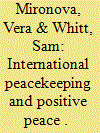

|
|
|
|
|
| Summary/Abstract |
To what extent can international peacekeeping promote micro-foundations for positive peace after violence? Drawing on macro-level peacekeeping theory, our approach uses novel experimental methods to illustrate how monitoring and enforcement by a neutral third party could conceivably enhance prosocial behavior between rival groups in a tense, postconflict peacekeeping environment. Using a laboratory experiment in postwar Kosovo, we find that third-party enforcement is more effective at promoting norms of trust between ethnic Serbs and Albanians than monitoring alone or no intervention at all. We then consider real-world extensions for building positive peace across different intervention environments. Using a dictator experiment that exploits heterogeneity in NATO peacekeeping in different regions of Kosovo, our inferences about monitoring and enforcement appear robust to ecological conditions in the field.
|
|
|
|
|
|
|
|
|
|
|
|
|
|
|
|
| 8 |
ID:
159862
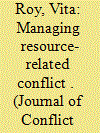

|
|
|
|
|
| Summary/Abstract |
States endowed with valuable lootable natural resources tend to experience longer armed conflicts, more intense fighting in extractive regions and face a higher risk of recurring conflict than states without such resources. At the same time, many states defy resource-fueled conflict traps and set up institutional arrangements that seem to alleviate the risk of recurring conflict. However, policy makers and academics alike lack a sound understanding of the link between postconflict stabilization and strategies of resource management that often escape the paradigm of “good resource governance.” This article contributes to the questions of how to conceptualize diverse institutional arrangements in the resource sector and how to link these emerging institutions to postconflict stabilization. I develop a theoretical framework that predicts the risk of recurring armed conflict based on lootable resource management strategies and conditioning factors. The framework is then tested on a unique event history dataset. Results support the stabilizing effects of inclusive and publicly accountable modes of resource management as advocated for by proponents of “good resource governance.” Alternative resource management strategies either increase the risk of conflict recurrence or interact with other variables, changing the prospects of postconflict stability in important ways
|
|
|
|
|
|
|
|
|
|
|
|
|
|
|
|
| 9 |
ID:
194802


|
|
|
|
|
| Summary/Abstract |
What determines the outcomes of civil wars? Existing literature highlights numerous factors at the systemic, state, and organizational levels of analysis. Yet there is little research on the attributes of rebel leaders in shaping war outcomes despite ample theories of their importance in steering their organizations. This article focuses on rebel leaders’ age as one key driver of their behavior. Applying insights from developmental psychology to the context of armed rebellion, we argue that young rebel leaders are the most likely to suffer military defeats, middle-aged leaders to win military victories, and elderly ones to reach negotiated settlements. We use a mixed-methods strategy to substantiate our claims, combining case studies of George Washington and Yasser Arafat with new data from the Rebel Organization Leaders (ROLE) database. Our findings help advance the study of non-state violent leaders in world politics while illuminating neglected sources of risk and opportunity for peace practitioners.
|
|
|
|
|
|
|
|
|
|
|
|
|
|
|
|
| 10 |
ID:
153657
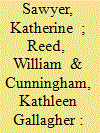

|
|
|
|
|
| Summary/Abstract |
Many studies highlight the role that international intervention can play in prolonging civil wars. Yet, direct military intervention is just one way that external actors become involved in civil conflicts. In this article, a model is developed and analyzed that shows that when the government is unsure about how external support to the rebels will help rebel war-making capacity, it is the government that will continue fighting rather than settle the dispute. Different types of external support to rebels influence their fighting capacity differently, and some types of support create uncertainty about how new resources will translate into war-making ability. Specifically, more fungible sources of support (such as direct financial support) generate the most uncertainty for states as they attempt to estimate the effect of support to rebels on the conflict. Increased uncertainty inhibits bargained settlement, and disputes characterized by fungible external support are less likely to end than those where rebels receive different kinds of support. Empirical analyses demonstrate strong support for this argument; rebels that receive highly fungible external support (money and guns) are less likely to see conflict termination than rebels that do not.
|
|
|
|
|
|
|
|
|
|
|
|
|
|
|
|
| 11 |
ID:
169077
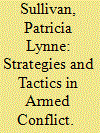

|
|
|
|
|
| Summary/Abstract |
We introduce a new data set on the strategies and tactics employed by belligerents in 197 internal armed conflicts that occurred between 1945 and 2013. The Strategies and Tactics in Armed Conflict (STAC) data set provides scholars with a rich new source of information to facilitate investigations of how regimes and their foreign supporters have responded to insurgent threats and the effects of actors’ force employment choices on a wide variety of intra- and postconflict outcomes. In addition to seventeen novel variables that measure the strategies and tactics employed by governments and intervening states, the STAC data set contains independently coded measures of many variables that overlap with existing data sets—a feature that facilitates the replication of existing studies and robustness checks on the results of new studies. We demonstrate the utility of the STAC data with an analysis of the impact of rebel mobilization on the basis of ethnicity on the propensity of governments to employ forced resettlement, civilian protection, civilian welfare projects, and civilian targeting to counter the insurgent threat.
|
|
|
|
|
|
|
|
|
|
|
|
|
|
|
|
| 12 |
ID:
077425
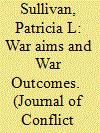

|
|
|
|
|
| Publication |
2007.
|
| Summary/Abstract |
Why are states with tremendous advantages in capabilities and resources often unable to attain even limited objectives vis-à-vis much weaker adversaries? The theory I develop focuses on how the nature of a strong state's war aims affects prewar uncertainty about the cost of victory. I argue that the relative magnitude of the effect of military strength and resolve on war outcomes varies with the nature of the object at stake and that strong states become more likely to underestimate the cost of victory as the impact of resolve increases relative to that of war-fighting capacity. I evaluate the empirical implications of this theory against the historical record provided by the universe of major power military interventions since World War II. The results challenge both existing theories and conventional wisdom about the impact of factors such as military strength, resolve, troop commitment levels, and war-fighting strategies on asymmetric war outcomes
|
|
|
|
|
|
|
|
|
|
|
|
|
|
|
|
| 13 |
ID:
149516
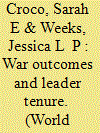

|
|
|
|
|
| Summary/Abstract |
A growing body of literature argues that war outcomes affect leaders’ tenure in office. But disagreement persists over how domestic political institutions translate performance in war into leader accountability. Some scholars argue that the tenure of democratic leaders is most sensitive to war outcomes, while others posit that autocratic leaders are more likely to be punished or rewarded for the outcomes of conflicts. The authors argue that existing research fails to take into account two important factors: whether the leader is viewed as culpable for the country's entry into the conflict, and whether the country features domestic institutions that make the leader vulnerable to removal from office, which varies greatly across nondemocracies. After taking leaders’ culpability and vulnerability into account, the authors show that the tenures of culpable, democratic leaders and culpable, vulnerable, nondemocratic leaders are sensitive to war outcomes. By contrast, the tenures of nondemocratic leaders who are less vulnerable to removal are not sensitive to war outcomes, regardless of their culpability.
|
|
|
|
|
|
|
|
|
|
|
|
|
|
|
|
|
|
|
|
|